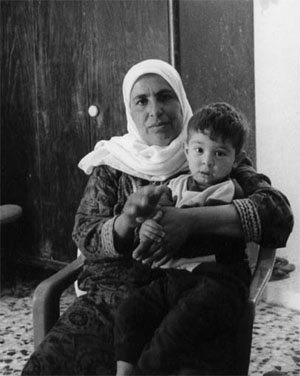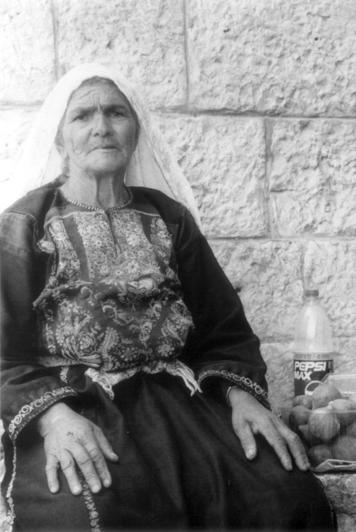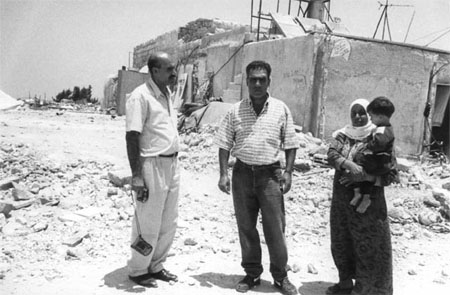
|
 |
| Aida Obeid holding her nephew in a single room left in her brother`s house. |
| Aida Obeid, Nabi Samuel, June 22:
|
|
A friend who was in Israeli prison for 17 years takes me to visit Nabi Samuel, a village to the west of Jerusalem where there have been recent bulldozings of homes -- the villages around Jerusalem are particularly targeted by this form of 'ethnic cleansing'. As we drive northwest down the magnificently wooded slopes from Jerusalem towards the sea, K. points out Israeli settlements, and tells me what Arab lands they confiscated to build them. But the first landmark outside Jerusalem is Lifta, until 1948 one of the most prosperous of Palestinian villages.
2
Now Lifta village is invisible, thickly covered with trees; somewhere inside it there is a zoo; between the trees are beautifully architected private villas.
Nabi Samuel's minaret soon shows from far away, high on the peak of a hill. It marks a holy place for Jews as well as Muslims. As we approach the center of the old village we see that the Mosque is surrounded by what appear to be archeological excavations. The present village spreads at some distance from the mosque. K. easily finds the home we have come to see from the rubble that surrounds it. In this case what was demolished was not the whole house -- a small square structure covered by a dome still stands -- it was utility rooms that the owners had built on, a kitchen, bathroom, and bedroom for a newly married brother. These additions had not been sanctioned by a permit, which in any case are impossible to get. The owners tell us the story of the destruction of Nabi Samuel. It did not happen in 1948 when the majority of Palestine's villages were demolished. Nabi Samuel lay in Jordanian-controlled territory, and a Jordanian unit was stationed here until the war of 1967. Then the village was occupied along with the rest of the West Bank. Some houses were damaged in the fighting but it wasn't at this moment that a cluster of some 30 houses around the mosque was blown up. Destruction came in 1971, when a corrupt mukhtar signed a paper affirming that the houses were shaky and likely to fall. One morning at 6am the Israeli Army came in trucks and gave them all one hour to get out. The old village homes were blown up and their owners were then transferred to storage rooms some 200 meters away. The Israeli authorities refused permits then and later for adding washrooms, windows, kitchens, etc. Our contact shares this single, utility-less home with his step-father. Three brothers live nearby. Last year the Israelis demolished the 'extra' construction of his brothers, took their building equipment, and imprisoned them for 48 hours. This year they came again -- more demolition. There's never time to save belongings. This family is bitter because of the total lack of help from any Palestinian quarter. They have been to the PNA official in charge of the Jerusalem file, they've been to the police, they've engaged a lawyer - all to no avail. Nationalism in this family goes a long way back: their grandfather was a martyr, and other family members were lost to the national struggle. Their photo portraits look down on us from the wall, barely visible in the dimness of the windowless room. Apart from a few chairs and a small table, there is no furniture. All the family belongings are stacked in suitcases on top of cupboards. Persistent demolition appears to be part of a plan to remove Nabi Samuel's Palestinian residents so that their land can be turned into a park. The village has been incorporated into 'Greater Jerusalem' but (as in the case of Bir |
'Ona) the residents have not been given Jerusalem ID cards, which means they cannot work there or claim its social benefits.
I record with the homeowner's sister, Aida, who is visiting. She holds her younger brother's baby in her arms. She can just remember the village being dynamited when she was a girl. She speaks first about her mother, whose life was permanently saddened by the loss of her father, brother, husband and home.
Aida Obeid speaks: My name is Aida Muhammad A'eed Obeid Barakat, from Nabi Samuel. I remember the day my uncle was martyred and the day -- how my mother told us about her life. All her life she was defeated and all her life she was suffering. And for us it's the same, all our life we suffer. What my mother lived - when they destroyed our house we were children. There was shouting and crying. We were playing in the neighbourhood. My sister was with me. Mash'allah, she has four children now. I carried my sister and put her beside a wall, and the bulldozer was about to go over her. The soldier was carrying her. He asked us, "How could you leave a child in front of the bulldozer?" I didn't know. We were playing. We were young children..." After I finish recording with Aida, her brother takes us to see the village and the Mosque. There's an Israeli soldier guarding the entry to the Mosque. We go up to the roof which has a wonderful panoramic view. Our contact points out new settlements, built since the Oslo Accords, doubly illegal; also the little cemetery where his parents are buried as well as a 'shahid' who fell on an explosive rather than let it blow up in the middle of a crowd of Palestinians in Bab al-Amood (Jerusalem). He says that his grandfather was involved in post-1948 resistance, though never acknowledged by national historians. From my travel notebook: "Coming out of the Mosque, we buy figs from an old lady, Hajji Sharifiyya. I record with her and photograph her. When younger, she looked after her parents, married late, had two daughters who live elsewhere, now has no one". It's a short recording. She speaks only about the land that she inherited from her father, and how she was cheated out of it by local collaborators. Hajji Sharifiyya speaks:"I'm Sharifiyya Hadi Muhammad Abed, from Nabi Samuel. I'm nearly 70 years old. God make you happy, I've lived all my life here in this village. And my father lived in this village. He lived until 92 years old. He owned almost 150 dunums of land, with and without trees. There were people [she gives their names] -- because my land was next to theirs - everyone in the village knows my land - they sold their land and mine along with it. I applied to register it with a tabu but many parts [of the land] were excluded because they had been registered before. I don't sleep [ie. live] on the land. Those people went with the permission of the mukhtar and surveyed the land, without the permission of the owners. It wasn't in my name..." |
| 2. Writing in the 1930s, the Finnish anthropologist Hilma Granqvist says that the dowry to be paid for a bride from Lifta was the highest in area. |
 Hajji Sharafiyyeh, Nebbi Samuel |
 |
|
Aida Obeid with her brother and nephew, standing beside brother`s house soon after it was partially destroyed. Nebbi Samuel village, June 1998 |
[Bedouin women ] [Umm Muhammad al-Rashaydeh] Copyright©2005 |
|